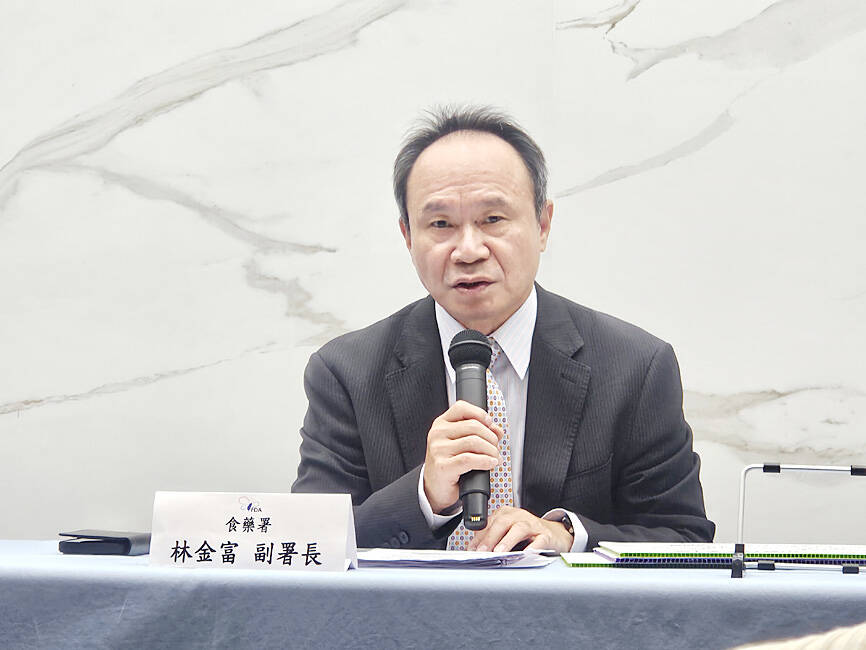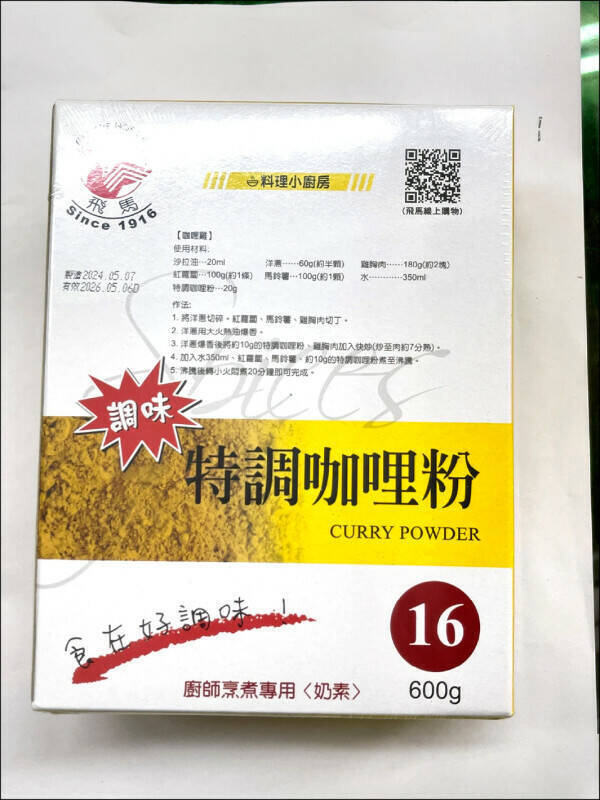A banned toxic Sudan red dye was detected in turmeric used in a curry powder sold by a Taiwanese company, the Food and Drug Administration (FDA) said yesterday, while the Ministry of Education informed schools nationwide to temporarily suspend the use of the powder.
The Flying Horse Special Mix Curry Powder produced by Taiwanese company Chiseng Hong Ltd initially tested positive for 7 parts per billion (ppb) of Sudan I on Oct. 25 during a routine inspection by the New Taipei City Department of Health, the FDA said.
Following the initial detection, the agency sought to identify the specific raw ingredient in the product contaminated with Sudan dye, a red synthetic dye that is banned in Taiwan for use in foodstuffs, including types such as Sudan I and Sudan III, FDA Deputy Director-General Lin Chin-fu (林金富) told a news conference in Taipei.

Photo: CNA
The FDA tested one box of the batch of 5,253 600g boxes of curry powder produced by Chiseng Hong, with an expiration date of May 6, 2026, Lin said.
“Nine samples of raw ingredients used to produce this batch of mixed curry powder were also collected for a total of 10 samples submitted to the FDA’s research and analysis unit for testing,” he said.
The unit detected Sudan I in the curry powder at a concentration of 8ppb, while a qualitative analysis of the sample of turmeric powder, one of the nine raw ingredients, also confirmed the presence of Sudan I, he added.

Photo courtesy of Department of Health, Kaohsiung City Government
FDA Northern Center Director Cheng Wei-chih (鄭維智) said that the tainted curry powder produced by the Taipei-based Chiseng Hong had been distributed across nine counties and cities, and 1,958 boxes — about 37 percent of the total — have already been recalled.
The Ministry of Education instructed schools across the country to suspend the use of the curry powder until Jan. 20 next year.
That notice follows orders from local education authorities in Taipei, New Taipei City, Keelung, Taichung and Taoyuan issuing similar bans, with other cities and counties following suit. Some of those bans extended to all chili and curry powders.
Cheng said the turmeric powder used in Chiseng Hong’s curry powder was imported from India.
Twenty-two businesses in Taiwan have imported turmeric powder from India since 2022, he said, adding that health authorities would immediately initiate a comprehensive inspection of those businesses and the turmeric powder they imported.
In response to the incident, border inspections on turmeric powder imported from India would be subject to batch-by-batch inspection for Sudan dyes for one year starting from Tuesday, he said.
“Any Sudan dye detected at the border will result in the product being destroyed, without the option for return shipment,” Cheng added.
The incident involving Chiseng Hong’s curry powder followed a similar incident earlier this year, in which Sudan III was found in chili powder imported from China.
That prompted the FDA to implement batch-by-batch inspections on imported spices and sauces, including chili powders, from all countries beginning in early March.
Lin said that the tainted batch of turmeric powder was imported from India before the enhanced border inspections were implemented early this year.
“Therefore, our current border control measures remain effective,” he said.
However, the FDA later said that prior to Tuesday, 35 types of imported spices and sauces had been subject to batch-by-batch border inspections to screen for banned dyes and pesticides, but turmeric powder was not included.
None of the 35 types of spices and sauces subject to batch-by- batch inspections since March — including cumin, black pepper and chili powder, all ingredients in the mixed curry powder — tested positive for Sudan dyes, the FDA said.

An undersea cable to Penghu County has been severed, the Ministry of Digital Affairs said today, with a Chinese-funded ship suspected of being responsible. It comes just a month after a Chinese ship was suspected of severing an undersea cable north of Keelung Harbor. The National Communications and Cyber Security Center received a report at 3:03am today from Chunghwa Telecom that the No. 3 cable from Taiwan to Penghu was severed 14.7km off the coast of Tainan, the Ministry of Digital Affairs said. The Coast Guard Administration (CGA) upon receiving a report from Chunghwa Telecom began to monitor the Togolese-flagged Hong Tai (宏泰)

A cat named Mikan (蜜柑) has brought in revenue of more than NT$10 million (US$305,390) for the Kaohsiung MRT last year. Mikan, born on April 4, 2020, was a stray cat before being adopted by personnel of Kaohsiung MRT’s Ciaotou Sugar Refinery Station. Mikan was named after a Japanese term for mandarin orange due to his color and because he looks like an orange when curled up. He was named “station master” of Ciaotou Sugar Refinery Station in September 2020, and has since become famous. With Kaohsiung MRT’s branding, along with the release of a set of cultural and creative products, station master Mikan

RISING TOURISM: A survey showed that tourist visits increased by 35 percent last year, while newly created attractions contributed almost half of the growth Changhua County’s Lukang Old Street (鹿港老街) and its surrounding historical area clinched first place among Taiwan’s most successful tourist attractions last year, while no location in eastern Taiwan achieved a spot in the top 20 list, the Tourism Administration said. The listing was created by the Tourism Administration’s Forward-looking Tourism Policy Research office. Last year, the Lukang Old Street and its surrounding area had 17.3 million visitors, more than the 16 million visitors for the Wenhua Road Night Market (文化路夜市) in Chiayi City and 14.5 million visitors at Tainan’s Anping (安平) historical area, it said. The Taipei 101 skyscraper and its environs —

Taiwan on Friday said a New Zealand hamburger restaurant has apologized for a racist remark to a Taiwanese customer after reports that it had first apologized to China sparked outrage in Taiwan. An image posted on Threads by a Taiwanese who ate at Fergburger in Queenstown showed that their receipt dated Sunday last week included the words “Ching Chang,” a racial slur. The Chinese Consulate-General in Christchurch in a statement on Thursday said it had received and accepted an apology from the restaurant over the incident. The comment triggered an online furor among Taiwanese who saw it as an insult to the